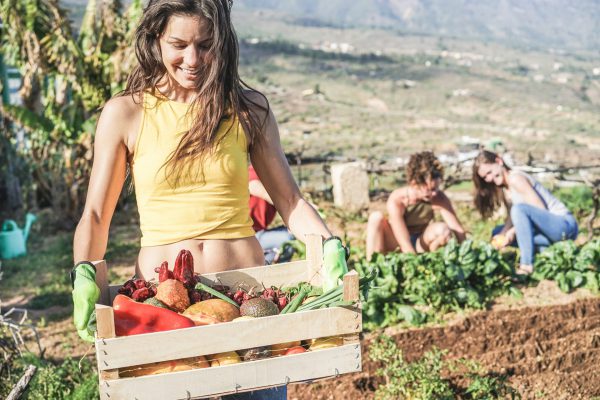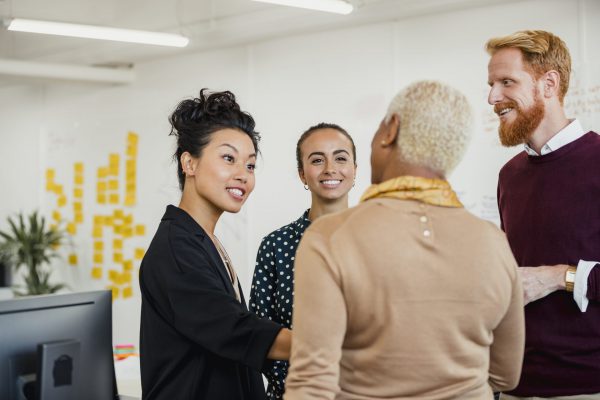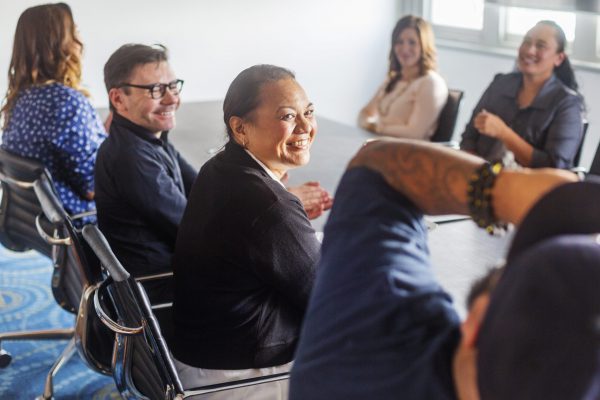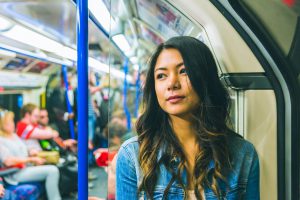Participatory democracy and localisation
-
Local programs and services
There is a need for more resourcing and funding for programmes to engage communities that often feel left out, such as people with diverse sexual orientations and minority cultures. Funding local peer support groups would ensure community ownership. Programmes for community members that have experienced multiple forms of discrimination (for example based on ethnicity, gender, disability) are identified as especially important to support.
We’re working with many women who are transgender at the moment [at XX], we’re working with Qtopia. That’s been eye-opening and an educational opportunity in that. For those transgender women to feel comfortable, we have had to look at it: on how we can make that sense of belonging work. Part of that is going to a workshop, when you come into it you feel like “I don’t belong” initially. Am I in the right place? I don’t know enough, I’m going to look silly. But by the end of it, you’ve got these friends. That sense of belonging, that shared purpose comes to the fore. The sense of not belonging is gone and replaced by a strong bond.
-
We’re working with many women who are transgender at the moment [at XX], we’re working with Qtopia. That’s been eye-opening and an educational opportunity in that. For those transgender women to feel comfortable, we have had to look at it: on how we can make that sense of belonging work. Part of that is going to a workshop, when you come into it you feel like “I don’t belong” initially. Am I in the right place? I don’t know enough, I’m going to look silly. But by the end of it, you’ve got these friends. That sense of belonging, that shared purpose comes to the fore. The sense of not belonging is gone and replaced by a strong bond.
-
Wrap-around support, that would have to be on an individual case. Me personally, I couldn’t think and I still struggle with trying to work things out of how to do that or where to go. Somebody to say, “they need this, this and this for support.” Like an advocate. WINZ tend to be quite intimidating. I do have a really good case manager. Just walking in there, you just feel like a naughty little kid.
-
Community level – people joining together around shared outcomes and this being an intersectional group.
-
I’ve trained [names the people in the room] in intentional peer support. That’s what we need, that’s what works for us.
-
If there’s like an Irish community. Embracing a little of my culture. Just wee bit of mine, I know I’m in a different country and I shouldn’t expect it, but just a wee bit. Being able to practice something close to home here. 4 years of asking, “please can we celebrate this”.
-
Equity: recognising that some people don’t have, through childhood or stuff that happens to them in life, that they don’t have the equal access to resources. Giving them equal access, put more into communities that do need, which we do in a way but don’t do in a way.
-
It’s nice to have that programme which I think is still in its infancy. Integrating the local community into the idea of having newcomers. In our district it’s happening very fast, in Hamilton it’s been happening over a long time.
-
There is a lot of hui but not much doing, realistically what can we do to make sure everyone at the table feels a sense of belonging. I think there's different strands of how that can happen. I think there's organic growth, accidental, incidental. There's deliberate things, programs, marae, so those are all potential things that are already happening on different levels. Look, there's no national statement on how to be inclusive.
-
[for LGBT in Queenstown]: There’s not a lot of support for that community. Not a very queer town. Not a lot of support. [Have] resources for our LGBTQ community in Queenstown. That does need to change in QT. There’s this one only for our youth.
-
The mental health crisis in NZ, there should be no cap for who needs help. It seems like it’s too hard at times until you’re literally jumping off a building. I feel like I’m spiralling, but I’m not spiralled so yeah.
-
-
Local resources and infrastructure
More community facilities and resources need to be available locally to enhance inclusion and belonging. Participants shared examples of community venues, prayer spaces, parks, seating, and restrooms. Councils often have areas available but put money-saving before resourcing spaces that would encourage community interaction. There also needs more frequent and reliable public transport to make communities more accessible.
The more structural thing: we have to refocus cities and towns and villages, they are not centres of commerce, they are places of living. We need to create environments that encourage that mingling. When I was living in Spain, in the south somewhere, after 6pm everyone came out and they walked around the square, and they met up with up people and they chatted. Socially they bonded. It was about tradition, and nothing to do with commerce, no money changed hands. You didn’t have to go but you knew they would be there. That was marvellous.
-
The more structural thing: we have to refocus cities and towns and villages, they are not centres of commerce, they are places of living. We need to create environments that encourage that mingling. When I was living in Spain, in the south somewhere, after 6pm everyone came out and they walked around the square, and they met up with up people and they chatted. Socially they bonded. It was about tradition, and nothing to do with commerce, no money changed hands. You didn’t have to go but you knew they would be there. That was marvellous.
-
If malls and airports had multifaith rooms – that would be good. NMIT have a place to pray. But they realise you can’t expect to have own place everywhere.
-
Council is sitting on tracts of land that could be used by community for community projects.
-
Would be good to have public transport available for longer.
-
We need enough venues for people to go to and join in.
-
More seats in public places, museums etc to sit and rest on when needed.
-
Well trained support workers who build up their clients and don’t tear down their self esteem when expectations are not met.
-
We don’t have transport for Kaikohe. We don’t have a bus service or train service so we can go shopping in Whangarei.
-
I think until we [council] are responsible for dispensing the resources so the community can be self-sufficient.
-
But creating towns for people to live in rather than commerce. Finding who you want to talk to making connections. There’s always something. Things like that. It doesn’t have to cost money, it just has to be a shift in thinking and shift in priorities. And people making an effort: ok we’ve had our meal, let’s go for a walk for 10 minutes and chat and be part of the group.
-
-
Local leadership
Local leadership must be stronger and community-based rather than business-focused. Participants shared that local leadership needs to be more accessible and diverse to respond to the community’s needs. They emphasised that when Māori representation in leadership tends to be more more focused on collective and community outcomes. They felt that Māori and Pasifika in leadership would be more favourable for everyone.
Upper management are people that have been in the organisation too long. People that oversee us, don’t come down to the coalface, they’re out of touch. They create policies that they don’t see how it will impact. Managers and governance, we’ve hardly ever met them. They decide on our pay, on how it runs, our hours, everything. It’s ironic, it’s a place that’s meant to make women valuable. But you’re not feeling that. It’s the team, that’s what keeps us together. Not from the whole refuge organisation. To be fair it’s not a collective, they make the rules and decisions we have to follow.
-
Upper management are people that have been in the organisation too long. People that oversee us, don’t come down to the coalface, they’re out of touch. They create policies that they don’t see how it will impact. Managers and governance, we’ve hardly ever met them. They decide on our pay, on how it runs, our hours, everything. It’s ironic, it’s a place that’s meant to make women valuable. But you’re not feeling that. It’s the team, that’s what keeps us together. Not from the whole refuge organisation. To be fair it’s not a collective, they make the rules and decisions we have to follow.
-
A more inclusive leadership.
-
Leadership approach in Aotearoa
-
People in leadership roles to do things like you’re doing now [conversations about belonging].
-
There is a movement towards that inclusivity, community engagement is the driver, if you have the representation that takes it up to the higher levels, change happens that way. You can't put somebody as a community representative when they haven’t been a part of the community.
-
We need to have more Māori working at the [xx health]. We need to look at our environment, and see how we incorporate [Māori culture] from environmental perspective. Do we have marae, how do incorporate karakia, waiata, how do we incorporate [things] from a tikanga perspective. It’s important to have Māori in all levels of the system. I sit at the leadership table of about 15 people, I’m the only one [who is Māori]. If you have more Māori, it becomes the collective response rather than just one person having to bring it up all the time.
-
The only way to fix the system is to get Māori in on it – give us the money and genuine leadership to do these things. Not just tick the boxes.
-
To me, it seems like when I’m on Zoom call, and they were being Māori led, there was a much higher level of trust and deeper conversation and trust than when Māori were not on calls. if translating that onto wider society, to transform, to bring Māori to lead spaces.
-
I think until we have Pacific and Māori see themselves at the higher level then, it is very hard to change this [in regards to being in a leadership roles in the work place/parliament].
-
More opportunities for family activities, that are ongoing. Some leadership at a local level, actually even understanding who is in their communities and what they need. If I’m feeling like this, there must be other people feeling like this. But there’s no forum to talk about the isolation that we have. Do they even have a community development person at Council? That person needs to have more of an understanding of what’s going on in the community.
-
Seems to be a lot of people, these community groups, what’s going on, what’s on offer. You see more and more groups turning up and doing great things. I’d never heard of them before. How do you get to know that. It’s just letting people know what’s there. A lot of stuff I missed. There are prob a lot of people who don’t know what’s going on.
-
Manufactured entry points into community, not just organic. Somebody needs to be responsible for that. Understanding who the community are. Under the old mayor they used to do an annual survey. I got the impression that the information didn’t really go anywhere. You’ve got to give qualitative information only if you ticked the dissatisfied box, not if you put neutral. Tick box exercise. Local councils that have the well-beings, how do they bring that to life in real terms? I suspect that it’s not being brought to life really.
-
What I felt is that people who if we had a sounding board in the community that we could relate to, that would've been really helpful. We didn't know much about New Zealand, it is not a place where you're going to have a 2-week holiday, we needed much more information, there was no sounding board in the community that we could find that we could relate to.
-
There’s a lot of work being done/services out there, but the barriers are: It can be local, so if you’re not in that local area you can’t access it. It can be hard to find. It is run for a particular group but you’re not part of that group so you can’t access it. You might be too scared to ask. There can be a cost to access
-
-
Participatory democracy
Being able to take part in decisions which affect you is part of feeling belonging - and participatory democracy is a way of enabling all of Aotearoa New Zealand to take part in decision-making. The current democratic system is European and favours European ways of doing things. Participants shared that Aotearoa New Zealand could create a system that reflects and empowers its diverse population. This would mean more participation at all levels in society to meet needs and create belonging.
Get quite macro on it. I tend to thing that, personally I think we need massive constitutional change. Transformation of the whole way the country, and the world, is run. The political system. The way the public service works. We have this imported Westminster system, and I don’t think it serves our people well. I haven’t figured out an alternative model. Democracy is held up as a model, but when you drill down it means the majority voting for the minority. Men voting on women’s rights, abusers voting on victims’ rights.
-
Get quite macro on it. I tend to thing that, personally I think we need massive constitutional change. Transformation of the whole way the country, and the world, is run. The political system. The way the public service works. We have this imported Westminster system, and I don’t think it serves our people well. I haven’t figured out an alternative model. Democracy is held up as a model, but when you drill down it means the majority voting for the minority. Men voting on women’s rights, abusers voting on victims’ rights.
-
I have to participate in the process, sharing the barriers to my sense of belonging. I can’t just be hōhā and moan about it, I have to participate in addressing it. Otherwise forever hold my peace as my kuia used to say.
-
I was educated and exposed to the collective Māori culture, if we could go back to that without the politics, it would be great. We sat around the fire, sharing stories, stories from different cultures, that was politics.
-
The essence of this is to talk to people, find the commonality. Saying “I’m not going to talk to a money-grubbing capitalist property developer…” cause you need to talk to them. How does that space get created so that we can create common foundation to then create trust and then discuss differences.
-
Empowerment is really important. Being able to build community is really important. People having control over their life. Access to resources, access to housing. Being in control, the state not being in control.
-
I think just being given space to be yourself and being open minded about how the world works and not that individualism but as being like, ‘right. How does a community support people to move through society?
-
When I think about this stuff, I think so many of our decision-makers don’t take into account the voices of young people, of communities who don’t have direct access to power and money and those sorts of things. I feel like I have been most connected to the truth of what needs to change in conversations with young people. Last year UNESCO held a hui for young people, they had written an incredible set of recommendations. They were Pacific, Māori, all sorts of young people, were hosted by mana whenua. 90 young people, totally mean things, a vision for Aotearoa. How we share power with young people. Linwood College sounds like the most amazing school, that it’s participatory and genuinely inclusive. How are we making spaces for voices in a way that is generally inclusive?
-
My experience in Aotearoa is the short memory. We can come together and be expressive and wanting to do the right thing. But anything that comes out of the collective narrative, we have to have accountability. Having those courageous conversations.
-






